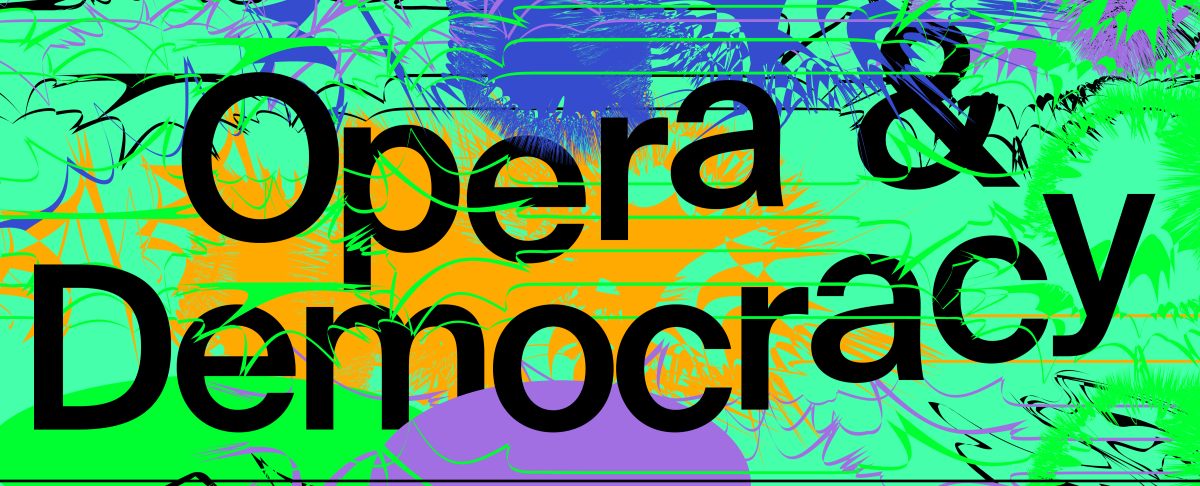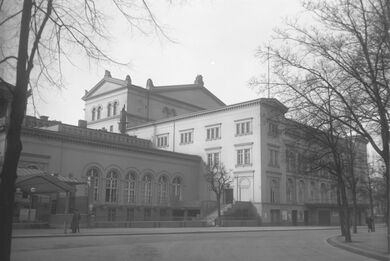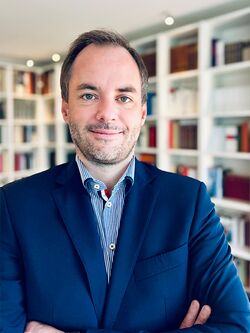Opera & Democracy: Transatlantic Conversations & Concerts

Info
The Thomas Mann House and musicologist Kai Hinrich Müller, a 2023 Fellow, will convene a transatlantic series of talks and concerts dedicated to the democratic potential of the opera – an art form that was also a great passion of Thomas Mann. Various events in the U.S. and Germany will explore the relationship between opera and democracy and how the opera can contribute to diverse and inclusive societies. The series is hosted by the Thomas Mann House in collaboration with partner institutions in the U.S. and Germany.
"It is precisely this idea of art and culture that drives the fight for democratic values and determines the program of the event at the TMH."
– Sophie-Charlotte Opitz (Frankfurter Allgemeine Zeitung)
The Series
This series commemorates the centenary of the reopening of Berlin's legendary Krolloper in 1924, one of the leading opera houses of the interwar period and today a symbol of both the renewal of opera in the 20th century and the struggle for democratic values in times of crisis. To honor this anniversary, panel discussions with international scholars and artists will explore the multifaceted history of this important institution and delve into the complex relationship between opera and democracy today. The focus will be on the democratic potential of opera and its possible contributions to a diverse and inclusive society. Topics range from aspects of the democratization of opera, to questions of power and representation, new formats, casting and programming policies, audience expectations as well as to academic challenges and opera's ability to amplify the voices of silenced or persecuted artists. Each conversation will be accompanied by concerts, sometimes world premieres, that present excerpts from rarely performed stage works, among them works by persecuted artists discovered in archives. Further information on all events can be found below.
Events
Opera & Democracy
Location: Thomas Mann House, Los Angeles
Music: Kurt Weill: The Yes-Sayer / Works by Richard Wagner, Lily Reiff, Edmond Dédé
Artists: Kaleidoscope Chamber Orchestra, Jan Vogler, Umi Garrett
Keynotes: Joy Calico, Michael Steinberg
Conversation: Daniela Smolov Levy, Kira Thurman, Alex Ross, facilitated by Kai Hinrich Müller
More information here.
Opera & Democracy II: Den gewaltsam Verstummten zuhören ...
Location: Bavarian Academy of Fine Arts / Bavarian State Opera, Munich
Music: Viktor Ullmann: Die Weise von Liebe und Tod des Cornets Christoph Rilke / Gideon Klein: Streichtrio (1944)
Artists: Susanne Gargerle, Tilo Widenmeyer, Allan Bergius, Noa Beinart, Robert Dölle, Vladimir Jurowski
Conversation: Lydia Grün, Vladimir Jurowski, Kai Hinrich Müller, facilitated by Andrea Thilo
In cooperation with the Bavarian Academy of Fine Arts and the Bavarian State Opera
More information here.
Opera & Democracy III: Demokratieförderung an der HfMT – Musikwissenschaft und Musikpädagogik im Fokus
Location: Cologne University of Music and Dance, Chamber Music Hall
Music: Jan-Hendrik Herrmann
Conversation: Antje Valentin, Nora Pempel, Andreas Niessen, Lukas Schumacher / Johann Honnens, Sabine Meine, Kristina Preis, Hannah Kopp, facilitated by Marco Lombardi
With support by: Förderfonds | Engagement für Vielfalt, Toleranz und Demokratie an der HfMT Köln
More information here.
Opera & Democracy IV: Listening to Exile
Locations: 1014 – space for ideas, Goethe-Institut, Austrian Cultural Forum New York, Leo Baeck Institute, Center for Jewish History
Music: Rosy Geiger-Kullmann: Excerpts from Emanuela, Ritter Lanzelot and Columbus (World premiere) / Paul Aron: Songs from Exile / Ernst Toch (arr. Paul Aron): Edgar & Emily / Ruth Schonthal: Excerpts from Princess Maleen / Erich Zeisl: Excerpts from Hiob / Works by Tania León, Ursula Mamlok and Alyssa Regent
Artists: Ellie Pope, Toby Banks, Benjamin Warschawski, Benjamin Sokol, Elliot Roman, Weiyu Wang, Rea Abel, Clara Cho and more / New Chamber Ballett (Choreography: Miro Magloire)
Conversation: Michael Steinberg, Brigid Cohen, Gracia Golden (Artistic Freedom Initiative), Kai Hinrich Müller, facilitated by Olivia Al-Slaiman
More information here.
Opera & Democracy V
Location: Palais im Großen Garten, Dresden
Music: Rachel Danziger: Excerpts from The Village Countess / Amélie Nikisch: Excerpts from My Aunt, Your Aunt
Artists: Nefeli Spyropoulou, Ekaterina Krovateva, Bálint Németh, Friedemann Gottschlich, Benjamin Hewat-Craw, Alexander Breitenbach
In cooperation with the Dresden Music Festival, Musica non grata and Terezín Music Academy
More information here.
Opera & Democracy VI
Location: Online
Conversation: Philip Miller, Tshegofatso Moeng, Allison Smith, Kai Hinrich Müller, Joy Calico, and Joshua Tolulope David.
An event by the Black Opera Research Network.
More information here.
Opera & Democracy VII
Location: Bayreuth Festival, Festspielhaus Bayreuth, Rehearsal stage 4
Topic: Wagner on Broadway
Keynote and discussion: Kai Hinrich Müller, Patrick Hahn
More information here.
Opera & Democracy VIII
Location: Brown University, Providence
Music: Darius Milhaud: Excerpts from Esther de Carpentras / Scaramouche / La création du monde / Video art by Steven Subotnick
Artists: Michal Friedländer, Hagar Sharvit, Angeline Sun, Consuelo Sherba, Lois Finkel, Katherine Winterstein, Daniel Harp
Keynotes: Kai Hinrich Müller, Katharina Galor
Conversation: Gayle Murchison, Edwin Seroussi, Samuel Turjman Thomas, facilitated by Katharina Galor
More information here.
Opera & Democracy IX
Location: Bauhaus-Archive – Museum of Design, Berlin
Music: Marc Blitzstein: Excerpts from Parabola and Circula (World premiere) / Cathy Milliken: Songs from Driving with Fatima
Artists: Michal Friedländer, Karl-Heinz Steffens and more
In cooperation with bauhaus music weekend 2024
More information here.
Opera & Democracy X
Location: Hamburg State Opera
Music: Ernst Krenek: The Dictator / Excerpts from Pallas Athena Weeps
Artists: Members of Hamburg State Opera, Volker Krafft
Under the patronage of General Music Director Kent Nagano
A collaboration between the Thomas Mann House, Los Angeles, the Hamburg State Opera, and the Körber Foundation.
More information here.
"The new Thomas Mann House series comes at the right time: the world is boiling and burning everywhere."
- Marco Frei (Bayerische Staatszeitung)
More about the Kroll Opera

They may shut down our opera house, but they cannot kill the idea, declared conductor Otto Klemperer after the closure of Berlin's iconic Krolloper, a cultural institution emblematic of the fusion of politics and art. Founded in the 19th century, it reopened in 1924 with a performance of Richard Wagner’s Die Meistersinger von Nürnberg, initially as an offshoot of the Berlin State Opera, then as an independent entity under Otto Klemperer (1927-31), who contributed to the institution's artistic significance. The opera soon became a gathering space for the avant-garde and an “intersection of social and artistic interests,” as Thomas Mann phrased it. The Krolloper pursued the idea of an inclusive and accesible opera, which was supported by social democratic politics and in line with the democratic achievements of the Weimar Republic. With the rise of reactionary forces, it was forced to close in 1931. Its musical and artistic heyday thus came to an end, but its history did not: after the Reichstag fire, the Krolloper housed the last parliament of the Weimar Republic, which fostered it's important role for the history of democracy and culture in Germany. It was also there that the Nazis abolished the Weimar Republic in 1933. Many artists affiliated with the Krolloper, such as Otto Klemperer, were persecuted and forced into exile. Otto Klemperer eventually moved to the U.S. and became the music director of the Los Angeles Philharmonic.
More about Kai Hinrich Müller

The series is led by Thomas Mann Fellow Kai Hinrich Müller, who studied musicology, business administration and law at the Rheinische Friedrich-Wilhelms-Universität Bonn and received his doctorate in 2013 with a thesis on the history of the early music movement. His habilitation followed in 2022. In his research, he deals with Richard Wagner and his reception in the Bayreuth circle as well as the so-called völkische Bewegung (nationalist movement), forms of anti-Semitism in music history, musical life in the interwar and especially Nazi period, as well as transatlantic opera history with a special focus on U.S. exile. He teaches at the Cologne University of Music and Dance, directs projects in Germany and abroad, and is the academic and artistic director of the Terezín Music Academy in the former Theresienstadt ghetto and the Bauhaus Music Weekend.




